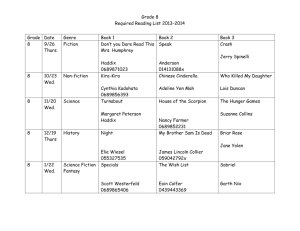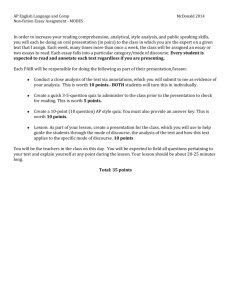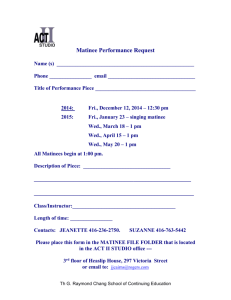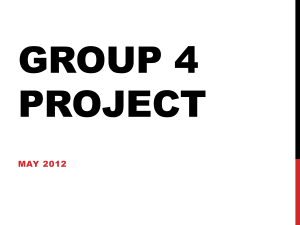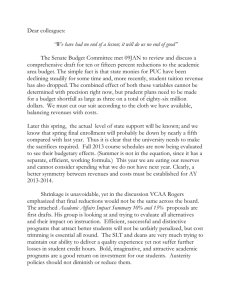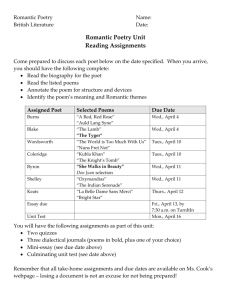the history of modern political thought
advertisement
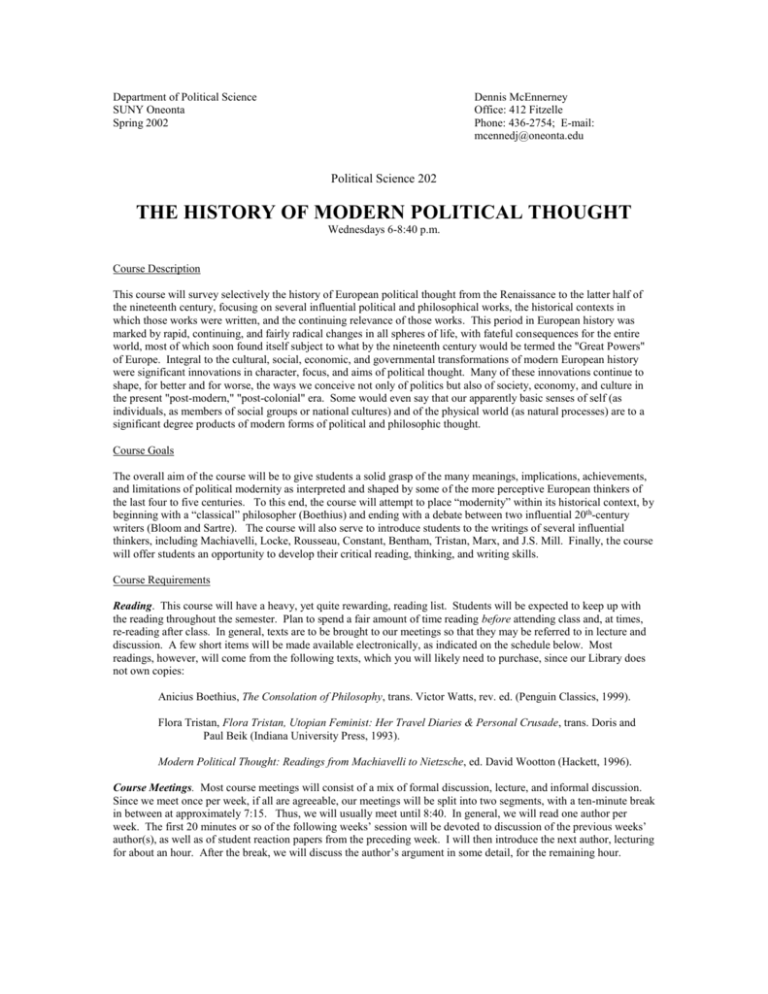
Department of Political Science SUNY Oneonta Spring 2002 Dennis McEnnerney Office: 412 Fitzelle Phone: 436-2754; E-mail: mcennedj@oneonta.edu Political Science 202 THE HISTORY OF MODERN POLITICAL THOUGHT Wednesdays 6-8:40 p.m. Course Description This course will survey selectively the history of European political thought from the Renaissance to the latter half of the nineteenth century, focusing on several influential political and philosophical works, the historical contexts in which those works were written, and the continuing relevance of those works. This period in European history was marked by rapid, continuing, and fairly radical changes in all spheres of life, with fateful consequences for the entire world, most of which soon found itself subject to what by the nineteenth century would be termed the "Great Powers" of Europe. Integral to the cultural, social, economic, and governmental transformations of modern European history were significant innovations in character, focus, and aims of political thought. Many of these innovations continue to shape, for better and for worse, the ways we conceive not only of politics but also of society, economy, and culture in the present "post-modern," "post-colonial" era. Some would even say that our apparently basic senses of self (as individuals, as members of social groups or national cultures) and of the physical world (as natural processes) are to a significant degree products of modern forms of political and philosophic thought. Course Goals The overall aim of the course will be to give students a solid grasp of the many meanings, implications, achievements, and limitations of political modernity as interpreted and shaped by some of the more perceptive European thinkers of the last four to five centuries. To this end, the course will attempt to place “modernity” within its historical context, by beginning with a “classical” philosopher (Boethius) and ending with a debate between two influential 20th-century writers (Bloom and Sartre). The course will also serve to introduce students to the writings of several influential thinkers, including Machiavelli, Locke, Rousseau, Constant, Bentham, Tristan, Marx, and J.S. Mill. Finally, the course will offer students an opportunity to develop their critical reading, thinking, and writing skills. Course Requirements Reading. This course will have a heavy, yet quite rewarding, reading list. Students will be expected to keep up with the reading throughout the semester. Plan to spend a fair amount of time reading before attending class and, at times, re-reading after class. In general, texts are to be brought to our meetings so that they may be referred to in lecture and discussion. A few short items will be made available electronically, as indicated on the schedule below. Most readings, however, will come from the following texts, which you will likely need to purchase, since our Library does not own copies: Anicius Boethius, The Consolation of Philosophy, trans. Victor Watts, rev. ed. (Penguin Classics, 1999). Flora Tristan, Flora Tristan, Utopian Feminist: Her Travel Diaries & Personal Crusade, trans. Doris and Paul Beik (Indiana University Press, 1993). Modern Political Thought: Readings from Machiavelli to Nietzsche, ed. David Wootton (Hackett, 1996). Course Meetings. Most course meetings will consist of a mix of formal discussion, lecture, and informal discussion. Since we meet once per week, if all are agreeable, our meetings will be split into two segments, with a ten-minute break in between at approximately 7:15. Thus, we will usually meet until 8:40. In general, we will read one author per week. The first 20 minutes or so of the following weeks’ session will be devoted to discussion of the previous weeks’ author(s), as well as of student reaction papers from the preceding week. I will then introduce the next author, lecturing for about an hour. After the break, we will discuss the author’s argument in some detail, for the remaining hour. Discussion. Students will be assigned the job of beginning at least one class discussion during the semester, and all students will be expected to participate in formal and informal discussions with some regularity. Performance in our discussions will strongly influence the participation grade. Writing and Examinations. Students will be required to write 8 two-page summary and reaction papers; one in-class midterm (70 minutes); one term project (5-6 pages); and an in-class final examination. Grading and Attendance Policies Grades will be assigned on an 100-point scale and weighted in the following manner: 1. Midterm Wed., 6 March 20% 2. Term Project Wed., 8 May 25% 3. Final Examination Wed., 15 May 30% 5. Reaction Papers (8) 16% 6. Discussion Leadership 2% 7. General Participation 7% TOTAL: 100% The two-page reaction papers will be graded minimally: plus, check, minus. For detail on this requirement, see page six of this syllabus. Regular, timely attendance is mandatory. Unexcused absences and tardiness will be noted and will affect grades negatively. Three unexcused absences will lower your grade one step (for example, from a B+ to a B). Each subsequent absence will lower your grade another step. Six or more unexcused absences may result in a failing grade. Tardiness will also be noted. After the third late arrival, every instance of tardiness will be treated as an absence. There are few course meetings, so be there and be on time. If you have a good reason to be absent or late, notify me in writing as soon as possible, explaining and documenting your absence. Either give me a note in class or send me an e-mail message. I will notify you if I accept your explanation, or if we need to talk more about it during my office hours. The schedule of exams appears above and below. You will be expected to attend both of them. Exceptions will be made only in extreme and unavoidable circumstances. Note that the final is on the last night of finals week. Expect to attend for the whole period, focusing on coursework throughout. If you have a good reason for arriving late or leaving early, please notify me in advance in writing (e-mail is best). If you cannot notify me in advance, do so as soon as you can afterwards. As a courtesy to all, please turn off pagers and telephones while in class. Note that this entire syllabus is subject to change at the discretion of the instructor. Office Hours/Communication I will hold regular office hours on Wednesdays from 9:30-12:30 p.m. in my office at 412 Fitzelle Hall. My telephone number is 436-2754. Notes can be left for me in my mailbox at the Political Science/Sociology Office, 324 Netzer Administrative Building. E-mail messages can also be sent to me at: mcennedj@oneonta.edu SCHEDULE OF MEETINGS, TOPICS, AND ASSIGNMENTS *Items preceded by an asterisk appear in Wootton, Modern Political Thought Note: All assignments are to be completed before class. 1. Wed., 16 January The Classical Perspective Introduction Class: Wed., 23 January Introduction to the course. Boethius’ Troubles, the Good Life, and the Classical Philosophical Tradition Reading: Anicius Boethius, The Consolation of Philosophy, Books 1-4, pp. 3-115. Writing: 2-page Boethius summary and reaction due in class. 2. Renaissance, Reformation, Enlightenment, and the Problem of Order Wed., 30 January Politics Ancient and Modern (1) / Renaissance Republicanism and the Rhetoric of Science Reading: Writing: Wed., 6 February Wed., 13 February *Niccolò Machiavelli, The Prince, Introductories and chs. 1-27, pp. 1-57. 2-page Machiavelli summary and reaction due in class. On Nature and Reformation (1) / Property and Liberal Society (1) Reading: *John Locke, Second Treatise of Government, Introductories and chs. I-XIX, pp. 303-86. Writing: 2-page Locke summary and reaction due in class. Property and Conformist Society (2)/ On Nature and Revolution (2) Reading: Writing: *Jean-Jacques Rousseau, Discourse on the Origin and Foundations of Inequality among Men, Introductories and Parts One and Two, pp. 397-463. 2-page Rousseau Discourse summary and reaction due in class. Wed., 20 February NO CLASS – ENJOY WINTER BREAK! Wed., 27 February Enlightened Republicanism Reading: *Rousseau, On the Social Contract, pp. TBA. Writing: 2-page Rousseau Social Contract summary and reaction due in class. 3. Individualism and the Spirits of Modernity Wed., 6 March MIDTERM EXAMINATION / Politics Ancient and Modern (2): British Radicalism/Atomism Reading: Wed., 13 March *Jeremy Bentham, An Introduction to the Principles of Morals and Legislation, Introductory and selection, pp. 581, 585-604. Kant on Revolutionary Morality / Constant on Politics Ancient and Modern (2) Reading: 1. *Immanuel Kant, "An Answer to the Question: What Is Enlightenment?"* pp. 573-77. 2. Benjamin Constant, "The Liberty of the Ancients Compared with That of the Moderns: Speech Given at the Athéné Royal in Paris," in Political Writings (Cambridge University Press, 1992), pp. 309-328. [Note: This reading will be placed on electronic reserve and on the course website.] Writing: Wed., 20 March 2-page summary and reaction paper on Kant and Constant. Politics European and Male? / Utopia and Modernity Reading: Flora Tristan, Flora Tristan, Utopian Feminist: Her Travel Diaries and Personal Crusade, Intro. by Doris and Paul Beik and chs. 1-2, 4-6, pp. ix-xxi and 1-33, 53-176. Writing: 2-page summary and reaction on Bentham and Tristan due in class. Wed., 27 March NO CLASS - ENJOY SPRING BREAK! Wed., 3 April Revolutionary Socialism: The End of Modern Politics? / After the Revolution: Critical Theory Reading: 1. *Karl Marx and Friedrich Engels, The Communist Manifesto, pp. 826-46. 2. * Karl Marx, Capital, pp. 865-73. Writing: 2-page Marx/Engels summary and reaction due in class. 4. Liberalism and the Problem of Morality Wed., 10 April Wed., 17 April Freedom and Humanity / Liberal Individuality and the Hope for Progress Reading: *John Stuart Mill, On Liberty, Introductories and chs. I-V, pp. 579-84, 605-72. Writing: 2-page Mill summary and reaction due in class. The Virtue of Modernity? A Conservative Critique Reading: Writing: Allan Bloom, "Our Virtues," selection from The Closing of the American Mind. [Note: This reading will be placed on electronic reserve and on the course website.] 2-page Bloom reaction paper due in class. Wed., 24 April Wed., 1 May Choosing Oneself? A Radical Call to Action Reading: Jean-Paul Sartre, "Existentialism Is a Humanism." trans. Bernard Frechtman, in The Fabric of Existentialism, eds. Richard Gill and Ernest Sherman, pp. 519-33. [Note: This reading will be placed on electronic reserve and on the course website.] Writing: 2-page Sartre reaction paper due in class. Review and Conclusions Reading: Wed., 8 April NO CLASS – FOLLOW MONDAY SCHEDULE Writing: Wed., 15 April Review the semester. Final project due at noon in my box in 324 Netzer Hall. FINAL EXAMINATION, 6-8:30 p.m. Two-Page Summary And Reaction Statements Over the course of the term, students will write at least eight short, informal summary-and-reaction statements. These pieces should: a) state in summary form what strikes you as the most significant or interesting point (or two points) made in the assigned text or texts; and b) explain your reaction to that aspect of the reading. These statements should be the equivalent of 1 ½ - 2 word-processed, double-spaced pages – so about 375-525 words long. The format is informal: your statement should list your name, the date, the assignment (the authors, titles, and chapters/pages discussed), and your own title at the top. You should divide the statement into two parts, one summarizing the reading's most important point or points and the other giving your reaction to the reading. You need neither quote nor cite the text, though you can, if you think it important to do so. The statements should be written in clear, Standard English prose. The style may be informal. As you write, don’t try to summarize all the points made in the reading. Focus on one or points (or, at most, three) that seems highly significant to you. This point or these points ought to have led you to think about something that seems important, significant, or meaningful. This point or these points need not be central to the reading, although in most cases I expect they will be. You may well write about some minor aside that the authors make, if that aside has led you to begin thinking. Just be sure to explain clearly and accurately what the authors say when you say the authors say something. Also, explain your reaction, your interest, your thought process. When I say, “explain,” I don’t mean saying that something is “interesting” or it has “made you think.” Instead, identify what in particular strikes you as interesting, or what specific problems or ideas the reading raised for you, and then give the reader some sense of why any of these ideas seem important or significant to you. What has led you to react in the way you have? This assignment is meant to be focused on your thoughts insofar as they relate to the readings. You may explain why the authors' claims seem to you wrong-headed, or really cogent; why they excite or repel you; why they have made you think of something in a new way, or why they seem to point to a dead end. You may explain why the piece seems really bad or really good to you. This assignment lets you think aloud, as it were. The assignment also, I hope, will further four other aims. First, it will give you a chance to work on mastering the readings, as well as to demonstrate to me that you have done the reading. If there are parts of the readings that you don’t understand, then write about the problems you have in seeing the author’s points. I’ll try to address those problems, either directly, by commenting on your paper, or indirectly, in class. Second, these assignments are designed to give you some easy practice in writing clearly and coherently. The more you learn to clarify your thoughts on paper, the better off you will be as a writer and student. Third, your comments may provide food for thought for you and your fellow students in class discussion and when you prepare to write exam essays. These papers will be graded minimally: plus, check, minus. At most, I will add only a few comments. Plus: a) the paper clearly and coherently develops an idea; b) it also accurately and fully summarizes what the readings say; and c) it convincingly and clearly shows why this point or line of thought is significant to you. Check: the paper is a serious effort that contains a reasonably accurate summary and a serious reaction. Minus: the paper is just thrown together, it lacks careful thought, or it is inaccurate about the reading, Pluses will earn extra credit (2.5%), with checks gaining full credit (2%), and minuses zero credit. I will give pluses rarely. I will sometimes give check/minus grades (1%). A check is the equivalent of an “A+” already for 2% of your final grade. There are eleven reaction papers assigned, but only the eight best will be counted for the final grade. No late papers will be accepted. See the schedule of classes for the specific reading assignments and the dates reactions are due.

